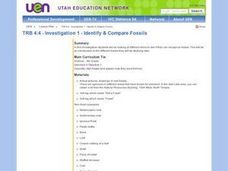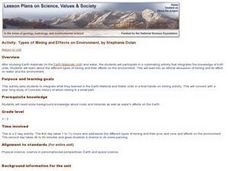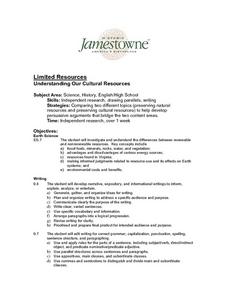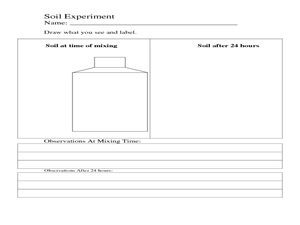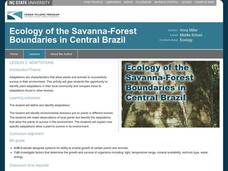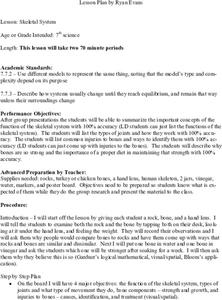Curated OER
Water Quality Comparison of Pulpit Rock Stream and Welton Falls
Eighth graders analyze different water samples given to them by their teacher.
Curated OER
Exploring Hawaii's Beaches
Fourth graders search the shore and find objects on the beaches of Hawaii. In this exploring Hawaii's beaches lesson, 4th graders play "I Spy" with objected collected at the beach. Students compare biotic and abiotic materials and...
Curated OER
Soil Composition
Students examine soil. In this soil composition lesson students participate in soil sedimentation and filtration activities. The students discuss what non-living and living things are in soil and why it is so important.
Curated OER
Mineral Replacement in Fossil Formation
Fourth graders explore fossils and how they are formed. They create their own "fossils" out of plaster of Paris. They record their findings in their science journals.
Curated OER
Investigation 1 - Identify & Compare Fossils
Fourth graders examine different items to see if they can recognize fossils. This be an introduction to the different fossils they be studying later and help them make inferences about past environments of Utah.
Curated OER
Regolith Formation
Students compare and contrast the process of regolith formations. In groups, students define regolith and discover how regolith is formed on the Earth and on the Moon. They participate in experimental activities to simulate regolith.
Curated OER
Inside Earth
Students study the makeup of the earth, including the core, the mantle and the crust. They compare the temperatures and thicknesses of each layer. In pairs, they make a model of a cross-section of the earth out of modeling clay.
Curated OER
Our Healthy Bodies
Students complete a variety of activities designed to enhance their awareness of their bodies. They examine pictures of themselves, taken at various points in the year and examine and compare their bodies. They enjoy a healthy snack...
Curated OER
Social Studies: Your Family Does What?
Sixth graders compare and contrast their own personal culture with that of Japan. They fill out questionnaires, compile the results, and match them with Japanese answers to the same forms. Students create a Venn diagram of the...
Curated OER
Earth's Surfaces
Students identify and define geology and earth surface vocaulary and their meanings to classify rocks and explore caves and their properties. Students find rocks and test them according to Moh's scale. They create a color coded earth...
Curated OER
Dinosaur I Finding And Dating
Students investigate how long dinosaurs lived on Earth and how that compare to how long man has been on Earth. They discover how scientists excavate fossils.
Curated OER
Soil Analysis
Pupils examine zip lock bags of clay, silt, and sand to determine its origin. They rotate through stations to compare different soils and perform oil separation and Tullgren funnel tests.
Curated OER
Limited Resources - Understanding Our Cultural Resources
Students examine and compare preserving natural resources and preserving cultural resources. They conduct Internet research on two topics, and write a position paper on whether cultural resources or natural resources are more important...
Curated OER
Bison Calculations
Students discuss how animals are cared for when they are captured. Using calculations, they determine how much food and water it takes for one bison and compare their water intake to humans. They also compare their weight to that of a...
Curated OER
Soil Scrolls
Third graders examine soil samples and explore the what happens in each layer of the subsoil. They work in cooperative groups to create a scroll that shows what takes place in each layer, and discuss why much of the activity is in the...
Curated OER
Stop Heat from Escaping
Students explore the uses of insulation and describe how insulation helps to conserve energy. They work in groups and use plastic, wool, paper and aluminum to experiment with the heat-retaining properties of various materials.
Curated OER
Regolith Formation
Students explain the difference between regolith formation on Earth and the Moon. For this space science lesson, students model the different factors affecting regolith formation on Earth. They identify the different types of weathering.
Curated OER
From Curiosity Cabinet to Museum Collection
Learners study binomial nomenclature and museum-based research. They create a curiosity box, label the objects in their curiosity box , develop a classification scheme for the objects, and create a database of all objects collected by...
Curated OER
Under Our Feet
Students investigate the forest ecosystem to learn of the living and non-living elements of the soil. In this ecosystem instructional activity, students examine soil for twigs, moss, fungi, leaves, roots and other matter. Students...
Curated OER
Regolith Formation
Students study what regolith is and how it contrasts with weathering on Earth. In this weathering instructional activity students divide into groups, hypothesize and confirm their guesses.
Curated OER
Adaptations
Sixth graders identify plant adaptations. In this adaptations lesson, 6th graders use digital cameras to photograph plants found on their campus. Students describe the adaptations for each plant.
Curated OER
Skeletal System
Seventh graders explore the functions of the skeletal system. They collaborate in small groups to determine the function of the skeletal system, the types of joints and movement, bone strength and growth, and bone injuries including...
Curated OER
Dinosaurs II Assembling a Dinosaur
Students investigate where scientists find dinosaur bones and decide why rebuilding them is important. They create a scale model of a dinosaur.







